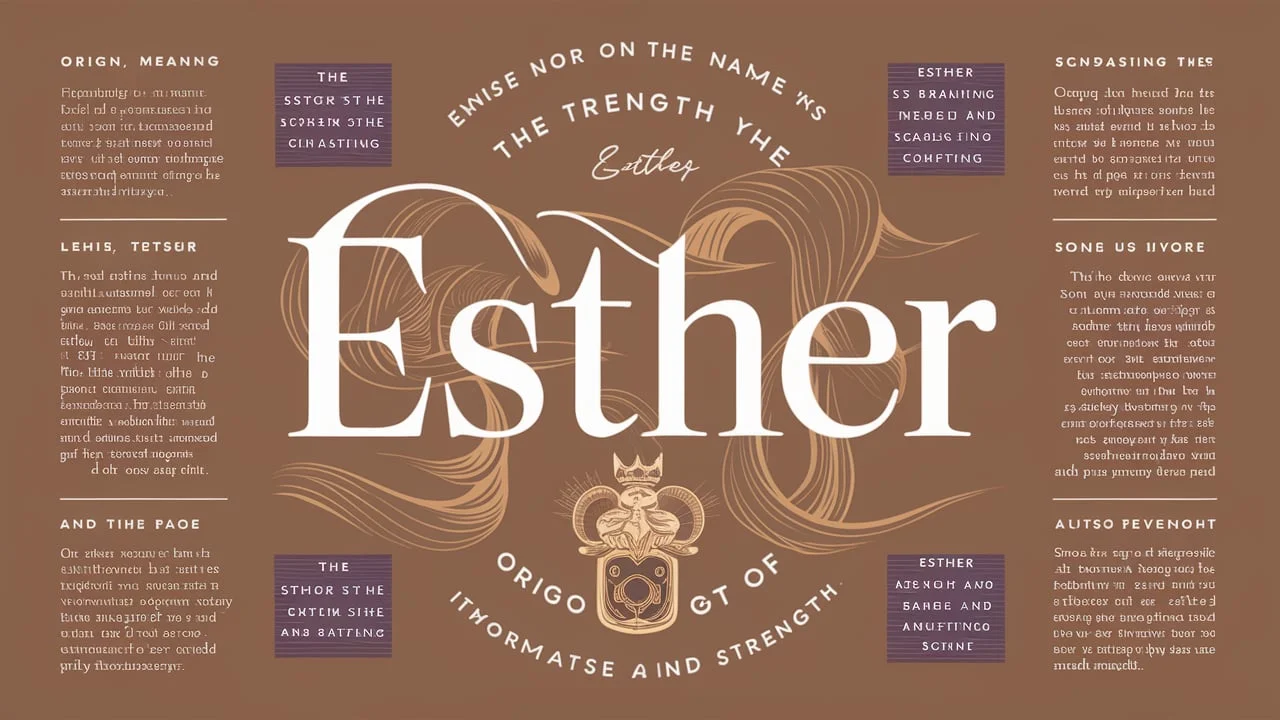Last Updated on October 22, 2024 by Ethan Richards
Understanding names can reveal a lot about history, culture, and personal identity. The name Esther is rich in meaning and significance, especially within a Biblical context.
In this comprehensive guide, we’ll delve into the origins, significance, and modern perceptions of the name Esther.
Exploring the Biblical Significance of Esther
Esther is a prominent figure in the Bible, particularly known from the Book of Esther in the Old Testament. Her story is one of bravery, faith, and strategic thinking.
- Historical Context: Esther, originally named Hadassah, was a Jewish orphan who became queen of Persia. Her story unfolds during a time of peril for the Jewish people, under the reign of King Xerxes I (Ahasuerus).
- Story of Queen Esther: Esther’s courage shines through when she risks her life to save her people from the wicked Haman’s plot. By revealing her Jewish identity to the king, she exposes Haman’s treachery and secures the safety of her people.
- Unique Traits: Unlike other Biblical figures, Esther’s story combines personal courage with political strategy. Her bravery in confronting the king, despite the risk to her life, and her wisdom in navigating court politics, make her a unique figure.
The Chosen One: Esther’s Divine Purpose
Esther’s role was not just a matter of personal bravery but also a reflection of divine intervention.
- Esther’s Destiny: Chosen by God, Esther’s story highlights the idea of destiny and divine timing. Her rise from an orphan to queen was seen as part of a larger plan to save the Jewish people from destruction.
- Role in the Purim Festival: The story of Esther is commemorated in the Jewish festival of Purim. This celebration marks the deliverance of the Jews from Haman’s plot, reflecting themes of survival and faith.
Lessons from Esther’s Life
Esther’s life provides numerous lessons that resonate beyond her time.
- Courage and Advocacy: Esther’s decision to approach the king, despite the law prohibiting uninvited entry to the royal court, demonstrates immense courage. Her willingness to stand up for her people teaches the value of advocacy and standing firm in one’s beliefs.
- Wisdom and Strategy: Esther’s approach to the king involved careful planning and strategy. Her use of feasts and tactful communication highlights the importance of wisdom in leadership and negotiation.
Spiritual Meaning of the Name Esther
The name Esther carries deep spiritual meaning, rooted in its origins and religious context.
- Etymology: The name Esther is derived from the Persian word setareh, meaning “star.” It is also linked to the Hebrew word s’ther, which means “hidden” or “secret.” This dual meaning reflects both visibility and concealment, aligning with Esther’s role in the Bible.
- Symbolism in Religion: In religious contexts, Esther symbolizes purity, bravery, and divine providence. Her story is often interpreted as a testament to God’s guidance and protection.
Numerological Interpretation of Esther
Numerology offers insights into the name Esther’s deeper meanings.
- Numerological Analysis: In numerology, the name Esther corresponds to the number 7. This number is often associated with introspection, spiritual growth, and enlightenment.
- Impact on Personality: Individuals named Esther may be seen as thoughtful, introspective, and spiritually inclined. The number 7 emphasizes a search for truth and a deeper understanding of life.
Popularity of the Name Esther
Esther’s popularity has fluctuated over the years, reflecting changing trends and cultural influences.
- Historical Trends: The name Esther was quite popular in the early 20th century, often reflecting traditional and biblical naming practices. It was a common choice for girls born in Jewish families.
- Current Trends: While not as common today, Esther has seen a resurgence in recent years. This revival reflects a growing appreciation for classic names with rich historical and cultural significance.
Gender and Variations of the Name Esther
Esther is predominantly a female name, but its variations and forms appear across cultures.
- Gender Associations: Traditionally, Esther is used as a female name. Its strong Biblical association and historical use in literature and culture reinforce its feminine identity.
- Variations and Derivatives: The name Esther has several variations, including Estelle, Hester, and Ester. Each of these names carries a slightly different nuance but retains the core essence of Esther.
Names Similar to Esther
Exploring names similar to Esther can provide additional options for those interested in classic and meaningful names.
- Related Names:
- Estelle – Derived from the French word for “star,” similar in meaning to Esther.
- Hester – An older English variant of Esther.
- Ester – A Spanish and Portuguese variation.
- Cultural Variations: In different cultures, Esther appears in various forms, such as Ishtar in ancient Mesopotamian cultures, reflecting its widespread influence.
Familiar Nicknames for Esther
Nicknames can provide a more casual or affectionate form of the name Esther.
- Common Nicknames:
- Essie
- Etty
- Estie
- Creative Alternatives: Less common nicknames include Star (playing off the meaning of the name) or Hessie.
Ideal Sibling Names for Esther
Choosing sibling names that complement Esther can enhance family naming harmony.
- Name Pairings:
- David – A classic name that complements Esther’s timeless quality.
- Rebecca – Another Biblical name that pairs well with Esther.
- Samuel – A strong, traditional name that balances well with Esther.
- Cultural Considerations: When selecting sibling names, consider the cultural and linguistic flow to ensure harmonious pairing.
Your next verse awaits—discover powerful Bible truths on our Home Page now or read more articles for deeper insights
Famous People Named Esther
Throughout history and in contemporary times, many notable individuals have borne the name Esther.
- Historical Figures:
- Esther Vilar – An Argentine writer known for her controversial works on feminism and society.
- Esther Williams – A famous American swimmer and actress known for her roles in 1940s and 1950s films.
- Modern Celebrities:
- Esther Perel – A renowned psychotherapist and author known for her work on relationships and sexuality.
Is Esther a Good Name for a Baby Girl?
Choosing a name for a baby is a significant decision. Here’s why Esther might be a great choice.
- Pros:
- Timeless Quality: Esther has a classic, enduring appeal.
- Rich History: The name carries historical and spiritual significance, adding depth to the choice.
- Unique Yet Familiar: While traditional, it’s not overly common, providing a unique yet recognizable name.
- Cons:
- Popularity Fluctuations: Its popularity has varied, which might affect personal preference.
- Potential Mispronunciations: In some cultures, the pronunciation might vary, leading to occasional confusion.
Conclusion
The name Esther is more than just a traditional name. Its rich Biblical background, spiritual significance, and historical prominence make it a meaningful choice for a baby girl. Whether you’re drawn to its classic charm, its historical resonance, or its modern revival, Esther remains a name with enduring appeal.
Understanding the depth of Esther’s significance can offer a greater appreciation for its choice and its place in both history and contemporary culture.

Ethan Richards is an accomplished author and dream interpreter known for his insightful and thought-provoking analyses. With a keen eye for detail and a passion for biblical studies, Ethan helps readers unlock the secrets of their dreams, offering clarity and spiritual enlightenment.










